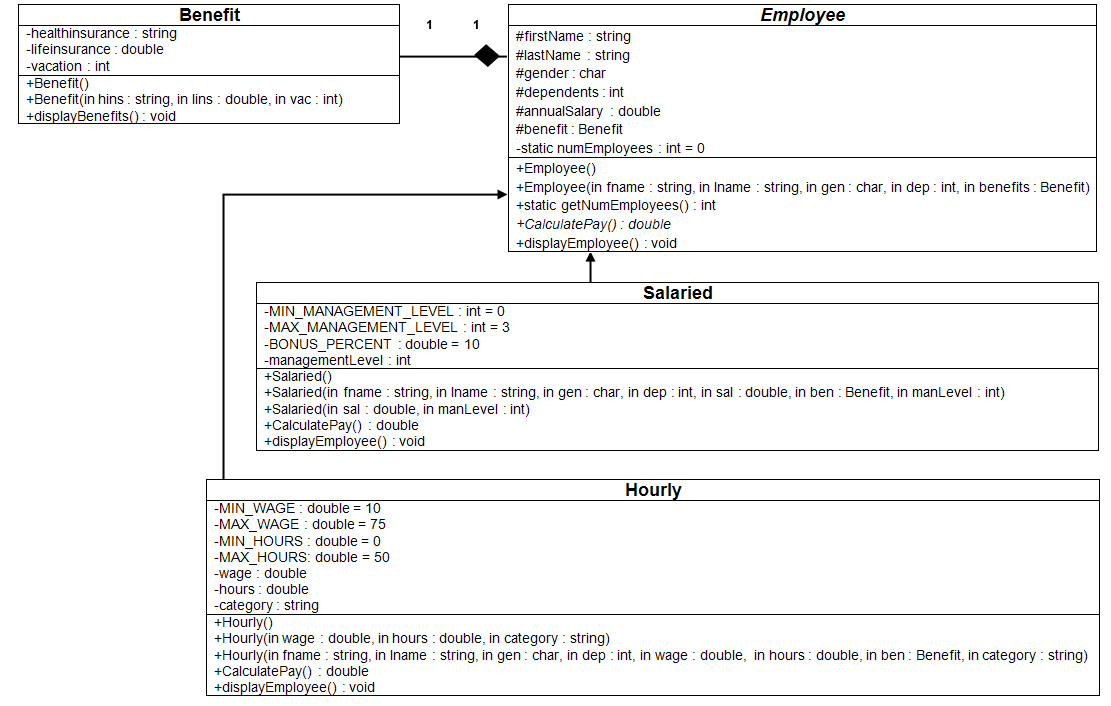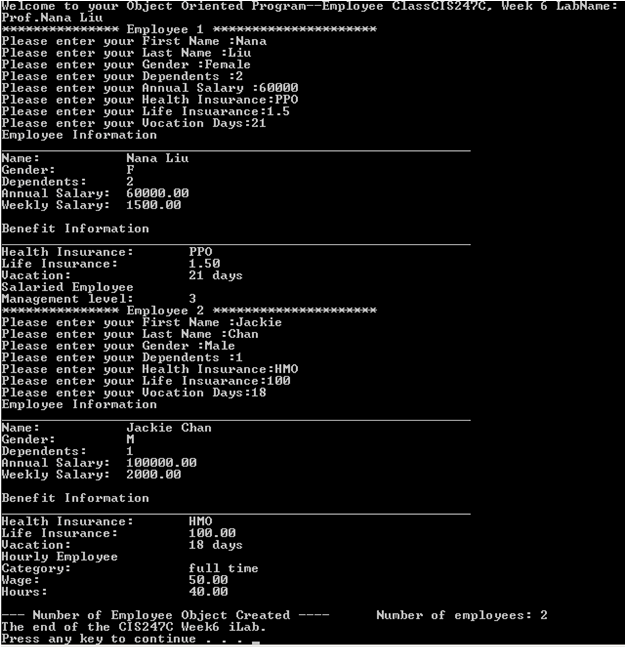Question
on c++ microsoft visual studio Scenario/Summary We have two separate goals this week: We are going to create an abstract Employee class and two pure
on c++ microsoft visual studio
Scenario/Summary
We have two separate goals this week:
We are going to create an abstract Employee class and two pure virtual functions - calculatePay() and displayEmployee(). The abstract Employee class will prevent a programmer from creating an object based on Employee, however, a pointer can still be created. Objects based on Salaried and Hourly will be allowed. The pure virtual function calculatePay() in Employee will force the child classes to implement calculatePay(). The other pure virtual function displayEmployee() in Employee will force the child classes to implement displayEmployee().
We are going to implement Polymorphism and dynamic binding in this Lab.
Software Citation Requirements
This course uses open-source software, which must be cited when used for any student work. Citation requirements are on the Open Source Applications page. Please review the installation instruction files to complete your assignment.
Deliverables
Due this week:
Capture the Console output window and paste it into a Word document.
Zip the project folder in the Microsoft Visual Studio.
Upload the zip file and screenshots (word document).
Required Software
Connect to the Lab here. (Links to an external site.)Links to an external site.
Lab Steps
STEP 1: Understand the UML Diagram
Notice in the updated UML diagram that the Employee class is designated as abstract by having the class name Employee italicized. Also, the calculatePay method is italicized, which means that it is a pure virtual function and needs to be implemented in the derived classes. In addition, make displayEmployee() method a pure virtual function as well.

STEP 2: Create the Project
Create a new project and name it CIS247C_WK6_Lab_LASTNAME. Copy all the source files from the Week 5 project into the Week 6 project.
Before you move on to the next step, build and execute the Week 6 project.
STEP 3: Modify the Employee Class
Define calculatePay() as a pure virtual function.
Define displayEmployee() as a pure virtual function.
When class Employee contains two pure virtual functions, it becomes an abstract class.
STEP 4: Create Generalized Input Methods
Reuse method getInput() from the previous Lab to prompt the user to enter Employee information.
STEP 5: Modify the Main Method
Create two employee pointers with:

The first employee pointer refers to a salaried employee and the second employee pointer refers to a hourly employee.
Prompt the user to enter information for these two pointers and display the calculated result.
For salaried employee, the following information needs to be displayed:
Partial Sample Output: 
For hourly employee, the following information needs to be displayed:
Partial Sample Output: 
STEP 6: Compile and Test
When done, compile and run your code.
Then, debug any errors until your code is error-free.
Check your output to ensure that you have the desired output, modify your code as necessary, and rebuild.
Below is a complete sample program output for your reference.

week 5
#include
#include
#include
#include
using namespace std;
class Benefit {
private:
string healthinsurance;
double lifeinsurance;
int vacation;
public:
Benefit() {
healthinsurance = "";
lifeinsurance = 0;
vacation = 0;
}
Benefit(string health, double life, int vaca) {
healthinsurance = health;
lifeinsurance = life;
vacation = vaca;
}
//method that displays employee information
void displayBenefits()
{
cout
cout
cout
cout
cout
}
void setHealthInsurance(string hins) {
healthinsurance = hins;
}
string getHealthInsurance() {
return healthinsurance;
}
void setLifeInsurance(double lifeins) {
lifeinsurance = lifeins;
}
double getLifeInsurance() {
return lifeinsurance;
}
void setVacation(int vaca) {
vacation = vaca;
}
int getVacation() {
return vacation;
}
};
class Employee
{
private:
static int numEmployees;
//member variables of Employee class
protected:
string firstName;
string lastName;
char gender;
int dependents;
double annualSalary;
Benefit benefit;
public:
//default constructor
Employee()
{
//set the member variables to default values
firstName = "not given";
lastName = "not given";
gender = 'U';
dependents = 0;
annualSalary = 20000;
//Incrementing number of employees
numEmployees += 1;
}
//constructor with parameters
Employee(string first, string last, char gen, int dep, double salary, Benefit benef)
{
//set the member variables to values passed
firstName = first;
lastName = last;
gender = gen;
dependents = dep;
annualSalary = salary;
//Incrementing number of employees
numEmployees += 1;
benefit = benef;
}
//getter methods
//method that gets firstName
string getfirstName()
{
return firstName;
}
//method that gets lastName
string getlastName()
{
return lastName;
}
//method that gets gender
char getGender()
{
return gender;
}
//method that gets dependents
int getdependents()
{
return dependents;
}
//method that gets annual salary
double getannualSalary()
{
return annualSalary;
}
//setter methods
//method that sets firstname
void setfirstName(string first)
{
firstName = first;
}
//method that sets lastname
void setlastName(string last)
{
lastName = last;
}
//method that sets gender
void setGender(char gen)
{
gender = gen;
}
//method that sets dependents
void setdependents(int dep)
{
dependents = dep;
}
//method that sets annual salary
void setannualSalary(double salary)
{
annualSalary = salary;
}
//Overloaded method that sets dependents
void setdependents(string dep)
{
dependents = stoi(dep);
}
//Overloaded method that sets annual salary
void setannualSalary(string salary)
{
annualSalary = stod(salary);
}
//method that calculates weekly pay
double calculatePay()
{
//calculate and return weekly pay
return annualSalary / 52;
}
//Static method
static int getNumEmployees()
{
//Return number of employee objects created
return numEmployees;
}
Benefit getBenefit() {
return benefit;
}
void setBenefit(Benefit ben) {
benefit = ben;
}
//method that displays employee information
void displayEmployee()
{
cout
cout
cout
cout
cout
cout
cout
cout
benefit.displayBenefits();
}
};
int Employee::numEmployees = 0;
class Salaried: public Employee
{
private:
int managementLevel;
const int MIN_MANAGEMENT_LEVEL;
const int MAX_MANAGEMENT_LEVEL;
const double BONUS_PERCENT;
public:
Salaried(); //Default constructor
Salaried(string fname, string lname, char gen, int dep, double sal, Benefit ben, int manLevel); //Overloaded constructor with all paramters passed
Salaried(double sal, int manLevel);//Overloaded constructor with partial paramters passed
double calculatePay(); //Function inherited from the Parent Employee class
void displayEmployee(); //display Employee details specific to Employee and Salaried objects
};
Salaried::Salaried():Employee(), MIN_MANAGEMENT_LEVEL(0),MAX_MANAGEMENT_LEVEL(3),BONUS_PERCENT(10) //Default constructor of salaried class which is calling parent class default constructor and initializing constant private variables
{
managementLevel = MIN_MANAGEMENT_LEVEL;
}
Salaried::Salaried(string fname, string lname, char gen, int dep, double sal, Benefit ben, int manLevel):Employee(fname, lname, gen, dep, sal, ben), MIN_MANAGEMENT_LEVEL(0),MAX_MANAGEMENT_LEVEL(3),BONUS_PERCENT(10)
//Overloaded constructor of salaried class that is calling parent class constructor and initializing all private constant variables
{
if (manLevel >= MIN_MANAGEMENT_LEVEL && manLevel
managementLevel = manLevel; //set managementLevel as entered
else if (manLevel
managementLevel = MIN_MANAGEMENT_LEVEL; //Initialize dependents to Min managementLevel
else if (manLevel > MAX_MANAGEMENT_LEVEL) //If value is greater than max managementLevel
managementLevel = MAX_MANAGEMENT_LEVEL; //Initialize dependents to Max managementLevels
}
Salaried::Salaried(double sal, int manLevel):Employee(), MIN_MANAGEMENT_LEVEL(0),MAX_MANAGEMENT_LEVEL(3),BONUS_PERCENT(10)
//Overloaded constructor of salaried class paramters that is calling parent class default constructor and initializing all private constant variables
{
if (manLevel >= MIN_MANAGEMENT_LEVEL && manLevel
managementLevel = manLevel; //set managementLevel as entered
else if (manLevel
managementLevel = MIN_MANAGEMENT_LEVEL; //Initialize dependents to Min managementLevel
else if (manLevel > MAX_MANAGEMENT_LEVEL) //If value is greater than max managementLevel
managementLevel = MAX_MANAGEMENT_LEVEL; //Initialize dependents to Max managementLevels
this->annualSalary = sal;
}
double Salaried::calculatePay() //Function calculatePay is overridden and gives a different meaning for Salaried class
{
double actualBonusPercentage = managementLevel * BONUS_PERCENT / 100; //Bonus percent = management leve multiply by 0.1 which is a constant here
double BonusAmount = actualBonusPercentage * this->annualSalary; //Total yearly bonus amount = bonus percentage multiply by annual salary
this->annualSalary = this->annualSalary + BonusAmount;
return (this->annualSalary) / 52; //weekly pay should be calculated like total annual salary plus bonus amount and here we are assuming 52 weeks in an year
}
void Salaried::displayEmployee() //display Employee details specific to Employee and Salaried objects
{
cout
cout
cout
cout
cout
cout
cout
cout
benefit.displayBenefits();
cout
cout
}
class Hourly: public Employee //Hourly class is inherited from employee class and inheritance level is set as public here
{
private:
double wage;
double hours;
string category;
const int MIN_WAGE; //Default value for MIN WAGE LEVEL
const int MAX_WAGE; //Default value for MAX WAGE LEVEL
const int MIN_HOUR; //Default value for MIN HOUR LEVEL
const int MAX_HOUR; //Default value for MAX HOUR LEVEL
public:
Hourly(); //Default constructor of Hourly class
Hourly(double wage, double hours, string category);
Hourly(string fname, string lname, char gen, int dep, double wage, double hours, Benefit ben, string category);
double calculatePay();
void displayEmployee();
};
double::Hourly::calculatePay()//Function calculatePay is overridden and gives a different meaning for Hourly class
{
return this->hours * this->wage; //Hourly employee pay would be equal to hours worked * hourly pay
}
Hourly::Hourly():Employee(),MIN_WAGE(10),MAX_WAGE(75),MIN_HOUR(0),MAX_HOUR(50)
{
wage = MIN_WAGE; //Initialize wage to default min wage value
hours = MIN_HOUR; //Initialize hour to default min hour value
category = "Unknown"; //Initialize category to default value
this->annualSalary = calculatePay()*50;
}
Hourly::Hourly(string fname, string lname, char gen, int dep, double wage, double hours, Benefit ben, string category):Employee(fname,lname, gen, dep, 0.0,ben),MIN_WAGE(10),MAX_WAGE(75),MIN_HOUR(0),MAX_HOUR(50)
//Overloaded constructor of Hourly class. The constructor will be calling overloaded constructor of parent class
{
double wge = wage;
if (wge >= MIN_WAGE && wge
this->wage = wge; //set WAGE as entered
else if (wge
this->wage = MIN_WAGE; //Initialize dependents to Min WAGE
else if (wge > MAX_WAGE) //If value is greater than max WAGE
this->wage = MAX_WAGE; //Initialize dependents to Max WAGE
double hour = hours;
if (hour >= MIN_HOUR && hour
this->hours = hour; //set Hour as entered
else if (hour
this->hours = MIN_HOUR; //Initialize dependents to Min Hour
else if (hour > MAX_HOUR) //If value is greater than max Hour
this->hours = MAX_HOUR; //Initialize dependents to Max Hour
if ( category == "temporary" || category == "part time" || category == "full time" ) //If value lies between min and max Hour
this->category = category; //set category as entered
else
this->category = "Unknown"; //set Category to unknown otherwise
this->annualSalary = calculatePay()*50;
}
Hourly::Hourly(double wage, double hours, string category):Employee(),MIN_WAGE(10),MAX_WAGE(75),MIN_HOUR(0),MAX_HOUR(50)
{
double wge = wage;
if (wge >= MIN_WAGE && wge
this->wage = wge; //set WAGE as entered
else if (wge
this->wage = MIN_WAGE; //Initialize dependents to Min WAGE
else if (wge > MAX_WAGE) //If value is greater than max WAGE
this->wage = MAX_WAGE; //Initialize dependents to Max WAGE
double hour = hours;
if (hour >= MIN_HOUR && hour
this->hours = hour; //set Hour as entered
else if (hour
this->hours = MIN_HOUR; //Initialize dependents to Min Hour
else if (hour > MAX_HOUR) //If value is greater than max Hour
this->hours = MAX_HOUR; //Initialize dependents to Max Hour
if ( category == "temporary" || category == "part time" || category == "full time" ) //If value lies between min and max Hour
this->category = category; //set category as entered
else
this->category = "Unknown"; //set Category to unknown otherwise
this->annualSalary = calculatePay()*50;
}
void Hourly::displayEmployee() //Function displayEmployee is overridden and display Employee specific plus Hourly specific information
{
cout
cout
cout
cout
cout
cout
cout
cout
benefit.displayBenefits();
cout
coutcategory
couthours
coutwage
}
int main()
{
//display banner
cout
cout
cout
//declare object for Employee
Employee emp1;
string fname, lname;
string gender, dependents, salstr, healthins;
double sal, lifeinsur;
int vacation;
//prompt and read employee information
cout
cin >> fname;
cout
cin >> lname;
cout
cin >> gender;
cout
cin >> dependents;
cout
cin >> salstr;
cout
cin >> healthins;
cout
cin >> lifeinsur;
cout
cin >> vacation;
Benefit bene(healthins,lifeinsur,vacation);
emp1.setBenefit(bene);
//set the employee information using setter methodds
emp1.setfirstName(fname);
emp1.setlastName(lname);
emp1.setGender(gender[0]);
/* Calling the new overloaded setters */
emp1.setdependents(dependents);
emp1.setannualSalary(salstr);
//display employee info
emp1.displayEmployee();
//Calling and displaying number of employee objects created
cout
cout
Benefit ben("HMO", 100, 16);
//create second object for Employee
//pass employee information as parameters
Salaried emp2 = Salaried("Jackie", "Chan", 'M', 1, 50000, ben,3);
cout
//display employee info
emp2.displayEmployee();
//Calling and displaying number of employee objects created
cout
cout
Benefit ben22("PPO", 5, 17);
//create second object for Employee
//pass employee information as parameters
Hourly emp3 = Hourly("James", "Bond", 'M', 0, 40, 50,ben22,"");
cout
//display employee info
emp3 .displayEmployee();
//Calling and displaying number of employee objects created
cout
cout
cout
return 0;
}
Step by Step Solution
There are 3 Steps involved in it
Step: 1

Get Instant Access to Expert-Tailored Solutions
See step-by-step solutions with expert insights and AI powered tools for academic success
Step: 2

Step: 3

Ace Your Homework with AI
Get the answers you need in no time with our AI-driven, step-by-step assistance
Get Started


